"Wow You're So Naturally Talented!" "You Truly Are Gif-" Biting You Biting You Biting You Biting You
"Wow you're so naturally talented!" "You truly are gif-" biting you biting you biting you biting you die die die die I didn't work for thousands of hours to get called naturally talented fuck you fuck you fuck you I wasn't a particularly gifted beginner I just didn't stop doing it aaaaaaaaaaaaaaaaaaa
More Posts from Bsdndprplplld and Others

mood: filling an open set with dyadic cubes and pretending this is studying measure theory
I think "high value person" can be interpreted as "someone who is liked by everyone and perfectly adheres to social norms" but also as "someone who wants to find their core values and to this end tries many different approaches" and many other things. some of the things listed are pretty good, such as "take care of themselves" or "doesn't equate their worth to sex", some are unnecessary: "perfected first impressions" or "ALWAYS well-dressed". naah, who cares lol
the thing with self-improvement or other forms of conscious existing (I just invented this term, by that I mean something like chosing which parts of oneself to keep and which to change) is that one must start somewhere. it's nice, in general, to have social relationships, sex life or hobbies and I see this list as a guideline for increasing the probability of achieving those and other things in a certain way
in my opinion it's really important to keep in check with oneself, ask if the cost of being likeable and elegant is worth it. some people derive pleasure from wearing nice clothes and make-up, I am not one of them and for me that would be too much of a sacrifice. I guess most people would hate to have my lifestyle: I basically do math all day. it is my decision to so, it's fun, and I hate it when someone assumes that it's bad just because they wouldn't enjoy it
hence I see this controversial list as goals of someone who genuinely wants to be perfect. and yeah I do think that most of those things are completely unnecessary, I don't consider this set of characteristics as a "high value person" but maybe some people do. a part of self-improvement for me was realizing that I don't care about most things and this post reminded me that there might exist people who care about everything. have they not yet realized that they actually don't care? idk, maybe they do care
but yeah if someone came to me and said that this list objectively defines a high value person then I would laugh lol I will respect everyone's values if they respect mine




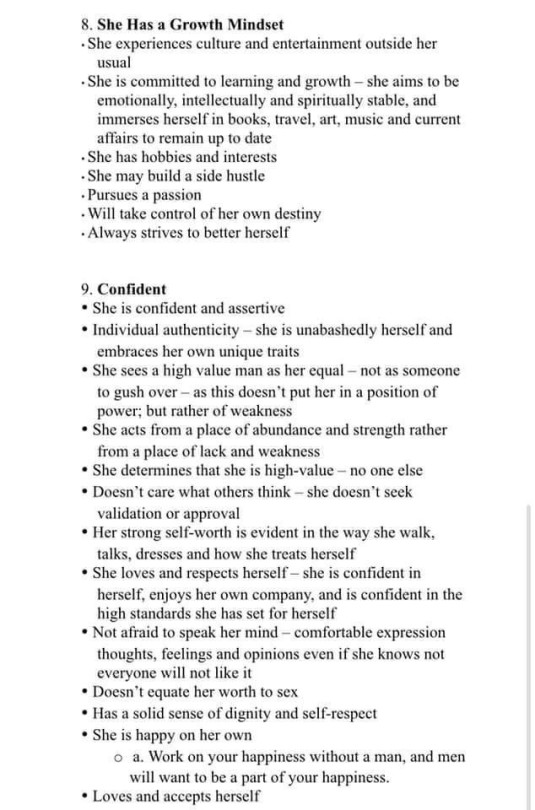
i am! obsessed! with this book from the late ming dynasty about scams to watch out for (esp. if you are a traveling merchant). this guy is like, there ARE immortals who can survive without food but you WILL NOT encounter them because they live alone in the mountains and don't talk to anyone. if a monk comes to your house and claims to not need to eat, it's probably because he's secretly eating human fetuses, or something. eunuchs are invariably corrupt and the court system is useless. however, do NOT try to bribe anyone for a better SAT result for your idiot failson; this never works. nuns WILL try to seduce your wife into cheating on you. if your idiot failson does really badly on the SAT, make sure to have his father's remains buried somewhere with A+ fengshui; this is Guaranteed to work (unless your wife is cheating on you).
also I don't get what "bad representation" is supposed to mean. given a number of symptoms and creating a character that has those symptom, it is almost certain that there exists an autistic person who will relate to that character, which is what the representation is for, no?
I've seen people making fun of the main character in the good doctor and saying that he's a bad representation, but the whole "I am a surgeon" situation is the most relatable thing I have ever seen in a show, so to me it's doing its job as a representation
how can someone simultaneously claim the existence of a "bad representation" and that every autistic person is different? it doesn't make sense to me
You can ask for more diverse autistic representation in media and criticize the current without making fun of the "stereotypical" traits autistic characters show because, you know, many of us do have these traits. And we're not faking it, and we are not stereotypes, and our traits and interest are not something to be ashamed of.
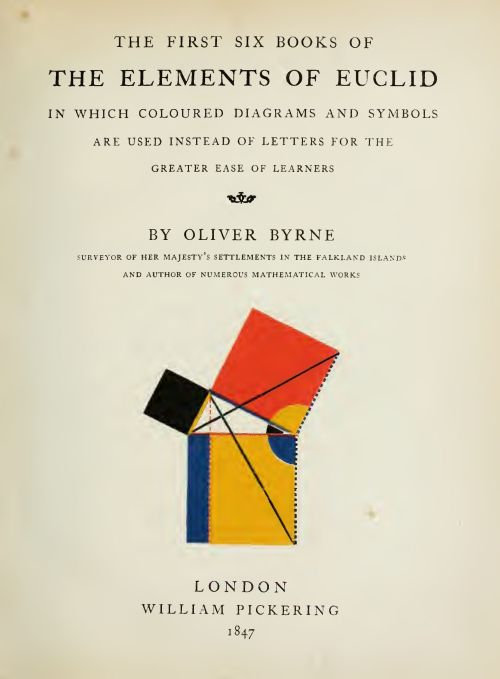
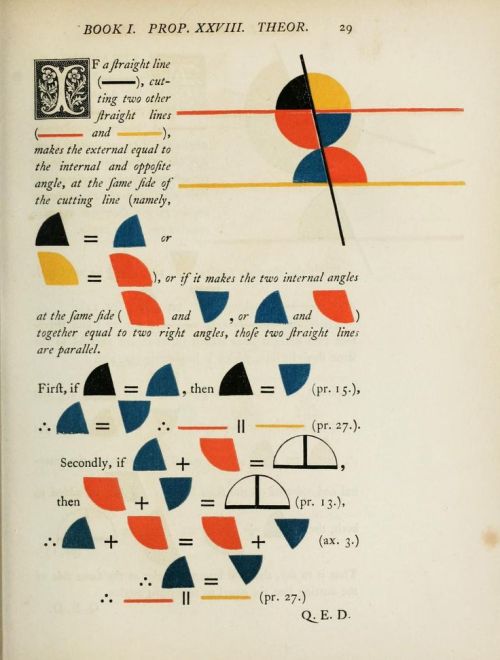
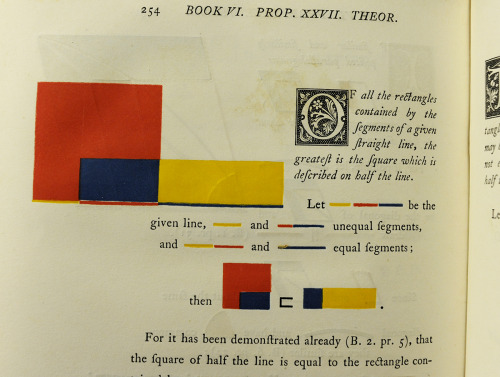
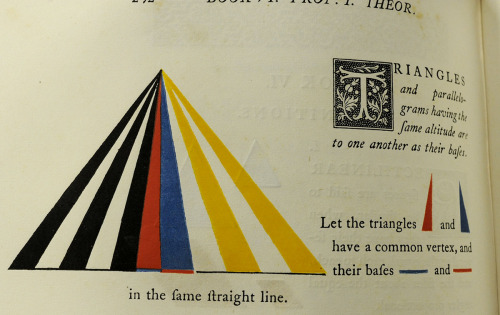
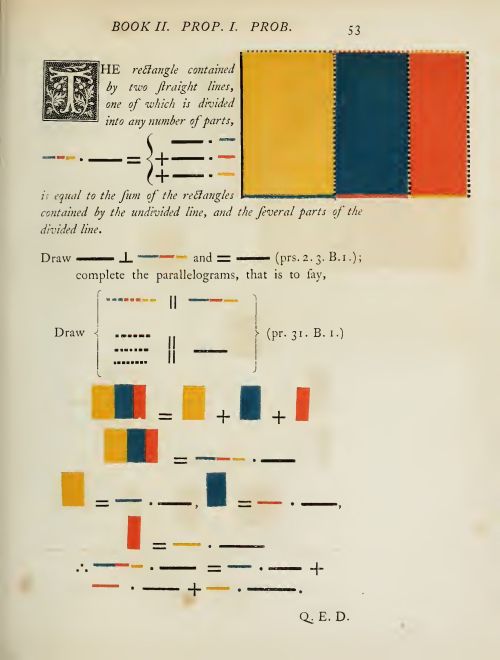

The beautiful modernism of Oliver Byrne’s, The First Six Books of the Elements of Euclid, 1847

I want to follow all of you!

℘²
Real estate agent, 5 minutes into the meeting with a topologist: So, when you were talking about "contracting" a "house with two rooms",

@dimiclaudeblaigan asked for a tutorial on how to begin drawing. Good news! If you can draw a funky looking stick man, you have already started!
I think that stick people are a great starting point for artists because of the things you can learn from them that will be important later on.
If you are able to draw a circle and a couple of lines, you can easily put together a stick person.

Congratulations! You have started to draw. :)
A stick person is a very minimal artistic representation of a real life person. It is simple yet recognizable, and is widely used in art, media, and signage.

But what can a stick person teach us about drawing people that look more like… well, people? Lets have a look!
By simply adding a few more lines, we can add a pair of eyes and a mouth. Maybe even a little triangle nose! Or half circles for ears. We can now draw a face, which provides a basis for all sorts of expressions.

These simple additions can allow us to explore the wide range of human emotion and individuality.

This may seem like the basics of the basics. But that is what we want! In order to get to the point where we are able to draw complex, elaborate representations of humans and objects, we will need to start with simple shapes like lines and circles and build our understanding from there.
For instance, lets give our stick person some cool new features, such as hands and feet. I chose little squiggly circles to represent hands, and triangles to represent feet.

We can go a step further and modify the body of the stick person to include shoulders, hips, elbows and knees. These parts of the human body are quite complex in real life But here, all we need to do is add a few simple lines and dots to our stick person.

The lines provide some additional structural elements to our stick person's body, which are the shoulders and the hips. The dots indicate the points of articulation - elbows and knees, the places where the arms and legs bend!
Now we can use our stick person to show us an even wider range of human movement, action, and expression.

Our little drawing of a human being is evolving! All it took was adding a few more lines and shapes here and there.
By elongating some of the existing lines and making the head an oval instead of a circle, we can give our stick person proportions that resemble that of a real life human.

By this point, we have managed to add more complexity to our stick person simply by using our ability to draw lines, circles, and other basic shapes!

These basic ideas are the building blocks that will enable us to create more complex shapes.
The next part may be a considerable step up if you are absolutely new to drawing, but I have decided to include it in order to show you how complex objects like the human body can be built from shapes that are a bit more complex than circles and lines.
For example. Two ovals and a rectangle can be combined to create a cylinder.

Six squares can be combined to create a cube, or a box. Here, each square is distorted slightly depending on which way the cube is facing.

Note that the back faces of the cube and the bottom of the cylinder are hidden. These shapes allow us to visualize that which should not normally visible.
A sphere from all perspectives can be represented by a circle. But we can make it more like a sphere by adding lighting and shadow if we so desire.

Cubes, cylinders, and spheres are examples of 'solid shapes' because they consist of 3 dimensions.
Lets see how these solid shapes can be used to compose the human body.
By stacking three cylindrical objects, we can create a torso. Two spheres have been added to form shoulders, while a smaller cylinder forms the neck.

An arm is an alternating sequence of spheres and cylinders connected together. Note that the hand has been simplified for this example.

We can apply these solid shapes to the rest of the body to give us a more recognizable representation of the human form. It doesn't even have to be perfect. And just like that, our stick figure now has a silhouette that is unmistakably a person!

In the above examples, notice that we kept the stick person at the beginning while building up the shapes and solids around it. This is because the stick person serves as a guide for positioning the body and its various parts -> also known as posing.
You can do the same thing to everyday objects! Here, I drew a wine glass by stacking these three dimensional solid shapes.

The cup and its contents are two ovoid shapes that were cut in half. The stem is a very thin cylinder shape. The base is a cylinder with a slightly wider bottom.
Solid shapes help inform us how objects and parts of the human body may appear from different perspectives.

For example, a sphere can be used to demonstrate how the human head appears when looking up or down, turned to the side, or tilted at an angle.

With these examples, I hope I have managed to convinced you that if you can draw a circle and a couple of lines, you can draw a person! You just have to train your eye to recognize the simple shapes within complex objects. Try it with everyday objects as well! Or even your favourite media! A drawing subject can be as simple or as complex as you envision it to be.

Once you have mastered that, there are many aspects of drawing you can explore from here that may require you to seek additional resources or a fellow artist's advice.

Last of all, remember that drawing is an iterative process. Even if you draw something correct the first time, you will need to draw it again and again to get it right all times! And by making small changes like the ones we explored in this tutorial, your drawings will gradually transform!
I hope what I've demonstrated here are enough to provide the basics of how to get started with drawing objects and people, and also to help refresh more experienced artists. :) Hopefully I didn't go too off topic with what was requested, and let me know if there are any more questions I can answer.
Cheers :3
-
 sour-patch-puppy liked this · 1 year ago
sour-patch-puppy liked this · 1 year ago -
 iliketoeatgravel liked this · 1 year ago
iliketoeatgravel liked this · 1 year ago -
 aquabery reblogged this · 1 year ago
aquabery reblogged this · 1 year ago -
 earlofgraey reblogged this · 1 year ago
earlofgraey reblogged this · 1 year ago -
 joytri liked this · 1 year ago
joytri liked this · 1 year ago -
 lowflying-angel reblogged this · 2 years ago
lowflying-angel reblogged this · 2 years ago -
 this-seems-familiar reblogged this · 2 years ago
this-seems-familiar reblogged this · 2 years ago -
 dellinspiron620 liked this · 2 years ago
dellinspiron620 liked this · 2 years ago -
 those-aspen-woods liked this · 2 years ago
those-aspen-woods liked this · 2 years ago -
 pergen reblogged this · 2 years ago
pergen reblogged this · 2 years ago -
 pergen liked this · 2 years ago
pergen liked this · 2 years ago -
 sublilium reblogged this · 2 years ago
sublilium reblogged this · 2 years ago -
 sublilium liked this · 2 years ago
sublilium liked this · 2 years ago -
 glenzof liked this · 2 years ago
glenzof liked this · 2 years ago -
 rebelliousbees liked this · 2 years ago
rebelliousbees liked this · 2 years ago -
 vulpes-sol-xix liked this · 2 years ago
vulpes-sol-xix liked this · 2 years ago -
 crumbtoo liked this · 2 years ago
crumbtoo liked this · 2 years ago -
 welcometothegoodtimes reblogged this · 2 years ago
welcometothegoodtimes reblogged this · 2 years ago -
 k-apostrophe-s liked this · 2 years ago
k-apostrophe-s liked this · 2 years ago -
 thatdamnokie reblogged this · 2 years ago
thatdamnokie reblogged this · 2 years ago -
 thatdamnokie liked this · 2 years ago
thatdamnokie liked this · 2 years ago -
 casual-corn-lover-blog liked this · 2 years ago
casual-corn-lover-blog liked this · 2 years ago -
 mavs-corner liked this · 2 years ago
mavs-corner liked this · 2 years ago -
 super-tired-robot reblogged this · 2 years ago
super-tired-robot reblogged this · 2 years ago -
 super-tired-robot liked this · 2 years ago
super-tired-robot liked this · 2 years ago -
 sandmanalone reblogged this · 2 years ago
sandmanalone reblogged this · 2 years ago -
 sandmanalone liked this · 2 years ago
sandmanalone liked this · 2 years ago -
 grumpyjesterr liked this · 2 years ago
grumpyjesterr liked this · 2 years ago -
 mxflintoldblog reblogged this · 2 years ago
mxflintoldblog reblogged this · 2 years ago -
 mxflintoldblog liked this · 2 years ago
mxflintoldblog liked this · 2 years ago -
 riotwizard liked this · 2 years ago
riotwizard liked this · 2 years ago -
 lazyflowercandy liked this · 2 years ago
lazyflowercandy liked this · 2 years ago -
 samis-side-of-the-story liked this · 2 years ago
samis-side-of-the-story liked this · 2 years ago -
 little-piece-of-tamlin reblogged this · 2 years ago
little-piece-of-tamlin reblogged this · 2 years ago -
 messthemaniac liked this · 2 years ago
messthemaniac liked this · 2 years ago -
 thava reblogged this · 2 years ago
thava reblogged this · 2 years ago -
 nicejobtwodads liked this · 2 years ago
nicejobtwodads liked this · 2 years ago -
 rampagingplant liked this · 2 years ago
rampagingplant liked this · 2 years ago -
 cecilias-cool-stuff reblogged this · 2 years ago
cecilias-cool-stuff reblogged this · 2 years ago -
 cecilias-cool-stuff liked this · 2 years ago
cecilias-cool-stuff liked this · 2 years ago -
 randomquotesandprose reblogged this · 2 years ago
randomquotesandprose reblogged this · 2 years ago -
 totalitariandemocracy liked this · 2 years ago
totalitariandemocracy liked this · 2 years ago -
 bsdndprplplld reblogged this · 2 years ago
bsdndprplplld reblogged this · 2 years ago -
 liambooi liked this · 2 years ago
liambooi liked this · 2 years ago -
 cecilias-cool-stuff reblogged this · 2 years ago
cecilias-cool-stuff reblogged this · 2 years ago -
 randomquotesandprose reblogged this · 2 years ago
randomquotesandprose reblogged this · 2 years ago -
 bsdndprplplld reblogged this · 2 years ago
bsdndprplplld reblogged this · 2 years ago

⁕ pure math undergrad ⁕ in love with anything algebraic ⁕
292 posts
